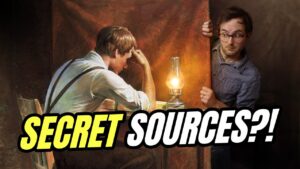Reviews
User Score
Rate This
Descriptions:
Was Joseph Smith a treasure-digger? And if so, what does that mean? Does that mean he practiced “witchcraft”? Or was he a necromancer? Or does this qualify as being involved in the occult? In this episode, David explores some new research that sheds some much-needed light on these “sinister” practices from the past. Spoiler alert: It’s not quite as sinister as some would have you believe.
Video transcript: https://saintsunscripted.com/faith-and-beliefs/living-the-gospel/truth-joseph-smith-treasure-digging-witchcraft-occult/
— “Redemption: The Treasure Quest and the Wandering Soul,” by Manuel Padro in the John Whitmer Historical Association Journal (Fall/Winter 2020, Vol. 40, No. 2): https://bit.ly/3T3uLTx
— “Cunning and Disorderly: Early Nineteenth-Century Witch Trials of Joseph Smith,” by Manuel Padro in Dialogue Journal (Winter 2021, Vol. 54, No. 4): https://bit.ly/3Mjz8Ie
— “Cunning Distortions: Folk Christianity and Witchcraft Allegations in Early Mormon History,” by Manuel Padro in Journal of Mormon History, Vol. 49, No. 1, 2023: http://bit.ly/3EsEzBD
— “Seer stone,” via The Joseph Smith Papers: https://bit.ly/3SPcsBx
— “Treasure Seeking,” via the Church’s website: https://bit.ly/3RvtYtE
— “Joseph Smith and Money Digging,” a short read by Richard Bushman (BYU Studies): https://bit.ly/3RK0iZL
— “That Old Black Magic,” by William J. Hamblin (BYU Studies): https://bit.ly/3VbyPTT
— “Treasures, Witches, and Ancient Inhabitants (D&C 111),” by Craig Ostler (BYU Studies): https://bit.ly/3Eo0Ql9
— “Martin Harris’ 1859 Interview with Joel Tiffany on Early Events in Mormonism,” via Doctrine and Covenants Central: https://bit.ly/3RLC1lZ
— “Joseph Smith’s money digging activities and how it relates to his character,” via FAIR: https://bit.ly/3CjmEM4
— Appendix 1: Agreement of Josiah Stowell and Others, 1 November 1825,” via The Joseph Smith Papers: https://bit.ly/3ypImNn
— “Joseph Smith’s family and ‘magic parchments,’” via FAIR: https://bit.ly/3VcrCD2
Notes:
— “Some symbols on Hyrum Smith’s parchment match symbols from Reginald Scot’s 1584 book, ‘The Discoverie of Witchcraft.’ Thus, some claim that the Smiths clearly understood and recognized that they were engaged in ‘witchcraft’ (after all, it’s in the title of the book, right?). Rest assured that this is not a safe assumption to make, for reasons that I am not currently at liberty to discuss here. For more info on this question, you’ll want to keep tabs on Manuel Padro’s upcoming publications.”
— We really don’t even know just how deeply Joseph was involved in this stuff. Joseph’s biographer, Richard Bushman, wrote,
“At present, a question remains about how involved Joseph Smith was in folk magic. Was he enthusiastically pursuing treasure seeking as a business in the 1820s, or was he a somewhat reluctant participant, egged on by his father? Was his worldview fundamentally shaped by folk traditions? I think there is substantial evidence of his reluctance, and, in my opinion, the evidence for extensive involvement is tenuous. But this is a matter of degree. No one denies that magic was there, especially in the mid-1820s.” Source: https://bit.ly/3RK0iZL
You’ll notice that even here, Bushman chooses such terms as “folk magic” to describe Joseph’s practices. I wonder if he might have chosen different words (like “folk-Christianity”) had he been aware of this more recent research coming from Manuel Padro. The evidence seems to suggest that practitioners didn’t view their practices as magical, but miraculous/folk-religious.
— Joseph seemed to be pretty open about his money-digging past. In one interview he was asked, “Was not Jo Smith a money digger[?]” to which he replied, “Yes, but it was never a very profitable job to him, as he only got fourteen dollars a month for it.” Source: https://bit.ly/3CMiSfo
— I also liked this quote from Padro’s article (pg. 77): “When compared to Pennsylvania Dutch accounts, it is obvious that these New Englander examples demonstrate a misrepresentation of the actual practice of treasure hunting by labeling it as both witchcraft and fraud. This begs an important question: If some of the best literary minds of New England cannot accurately describe the treasure quest of Teutonic-Americans, are the descriptions of the treasure quest recorded by average New England Americans trustworthy either? The answer is no. These sources were not ethnographers describing what they had seen, observed or participated in, but rather bigots describing what they imagined other people did, utilizing their own cultural views of witchcraft and fraud as the building materials for an imaginary event that they projected onto a group they saw as foreign.”
SUBSCRIBE:
http://saintsunscripted/subscribe
Follow the Hosts:
David: https://www.instagram.com/davidesnell/
Taylor: https://www.instagram.com/tsyorg/










